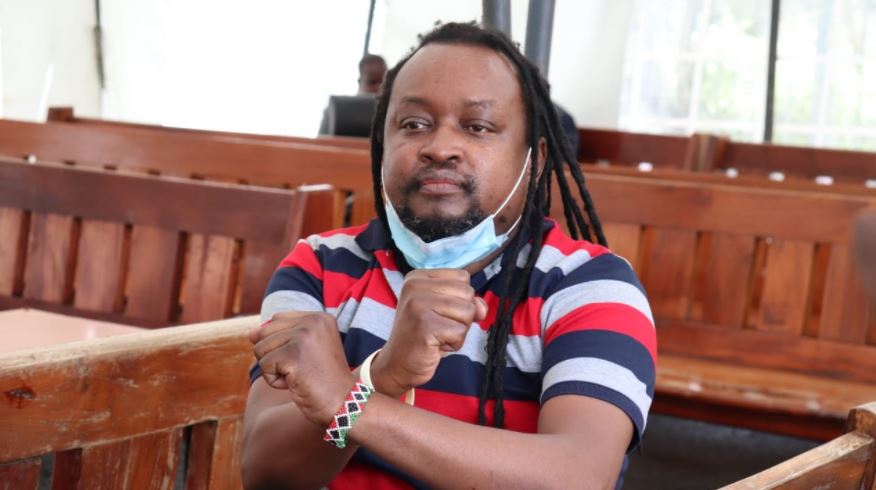 Social justice activist Mutemi wa Kiama is a free man following his recent incarceration over a poster indicating that President Uhuru Kenyatta is not authorised to act or transact on behalf of Kenyans.
Social justice activist Mutemi wa Kiama is a free man following his recent incarceration over a poster indicating that President Uhuru Kenyatta is not authorised to act or transact on behalf of Kenyans.
A court released Kiama on a cash bail of Sh500,000 pending completion of investigations.
The anti-IMF loan crusader spoke to the Nairobian about his activism journey and more.
Many people didn’t know you until you got arrested… Tell us a bit about your background…
I am a social justice activist focusing on social accountability and human rights. I’m also a movement-builder and I do political education. I come from Kirinyaga in Central Kenya and I have a communication training background. I am also a trained designer from the University of Nairobi.
How did your upbringing influence what you do?
My mother always stood for what is right and didn’t believe that a woman can’t do certain things. My family has three boys and one girl but that distinction was not there. Mother brought us up as equals, and I think having a strong woman also made me grow up respecting women. My grandfather was a teacher and a famous colonial chief who used to supply food secretly to Mau Mau fighters.
You are a social justice activist. How does this relate to your activist identity?
People like Mohammed or Jesus Christ emerged at a time when there was a lot of oppression in their communities. Majority of Kenyans are living in abject poverty and young people are jobless. Justice is what ensures that when you pay taxes, they are used for the right reasons unlike now where we are losing Sh2 billion daily. I felt that we needed to educate Kenyans to know their constitutional rights and freedoms, and also their responsibilities as citizens to hold leaders to account to ensure that resources are used for the right purpose.
What is the biggest threat you have ever faced as an activist?
Around 2013 to 2015 when ICC cases were ongoing, I was working for an organization called Inuka Kenya running a programme called Maskani ya Taifa. The programme used to push back against the ICC narrative. There were many threats against anybody who opposed the prevailing narrative and I remember being threatened to comply or I would face the music.
You were recently arrested for publicly criticising the government. What was your experience like?
The initial arrest was very intimidating. It was the second time because I had been arrested in June last year after posting a viral thread on colonial chiefs. Psychologically, I was prepared, but what surprised me was how accommodative the police and cellmates were to me.
What projects are you currently working on?
I do political education and help fellow activists to speak to their communities. Currently, I’m part of Kongamano la Mageuzi that is working to build a political movement that will take the country to the 21st century.
If you got five minutes with the president, what would you tell him?
I would tell him to quit. But I would also ask him to take a walk to Korogocho and not using a Prado. Talk to the people, create that interaction and find out if what is being done is just public relations or propaganda.
How did your mother’s death change things for you?
In 2016, I got a call that my mother was unwell and needed an operation. We couldn’t find a single ICU bed in Central Kenya. By the time she was coming to Nairobi she was in a coma. Mom died and left a bill of Sh1.6 million for the 21 days she spent in Kenyatta and we didn’t have the money. Kenyans fundraised because they appreciate the work that I do online, and this proved to me that I was in the right direction.
Where do you draw your inspiration from?
What inspires me is when Kenyans come together to tackle challenges. My passion comes from amplifying others’ voices and speaking for those who can’t speak for themselves.
Who is your mentor?
Dr Rev. Timothy Njoya. Not many people know the work he did so that we could get the second liberation. Every day he would join people in Kibra and walk with them to Industrial area so that he could talk to them. The groundwork he did was inspiring.






